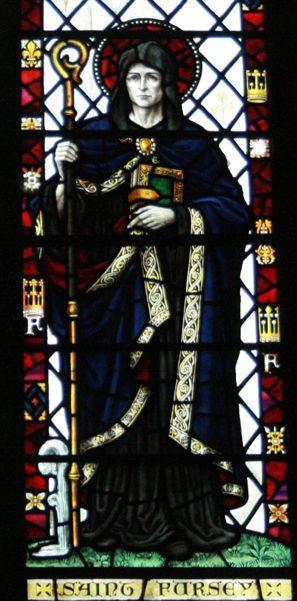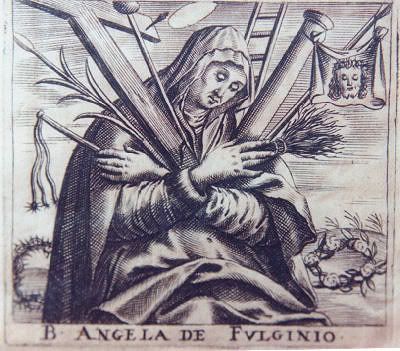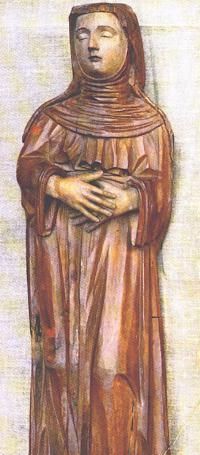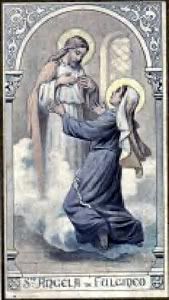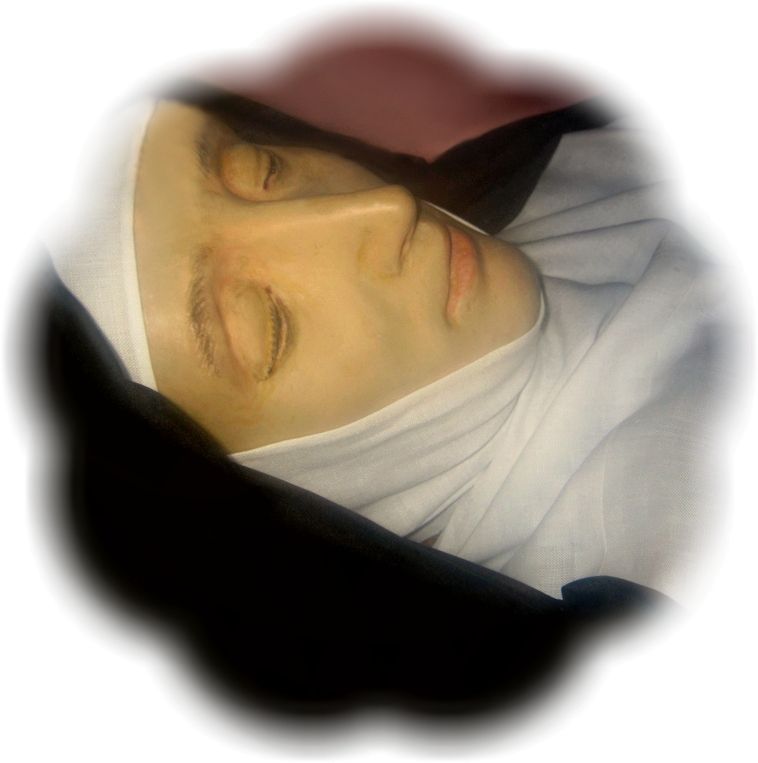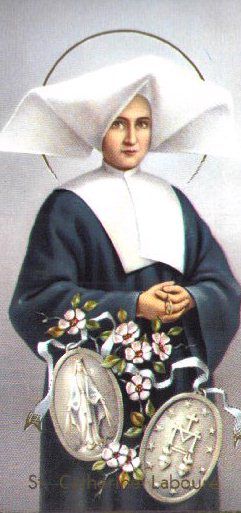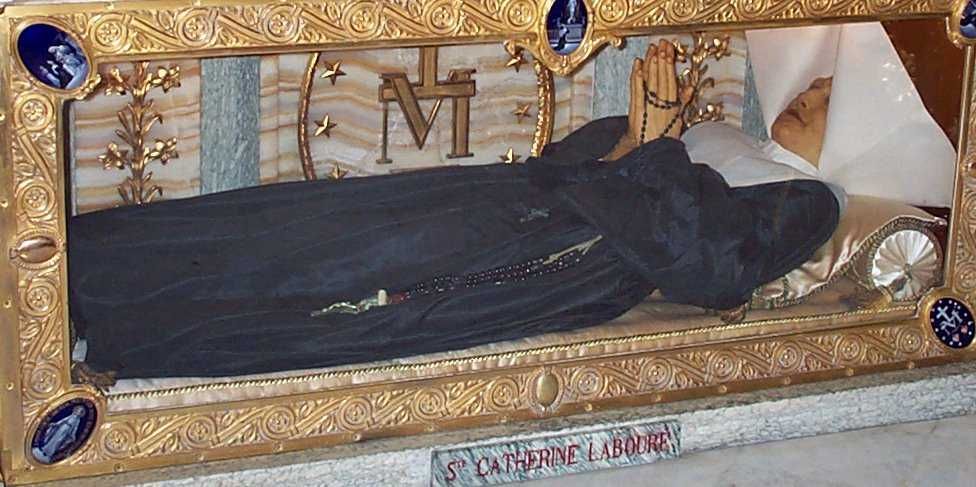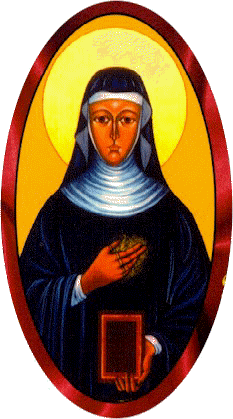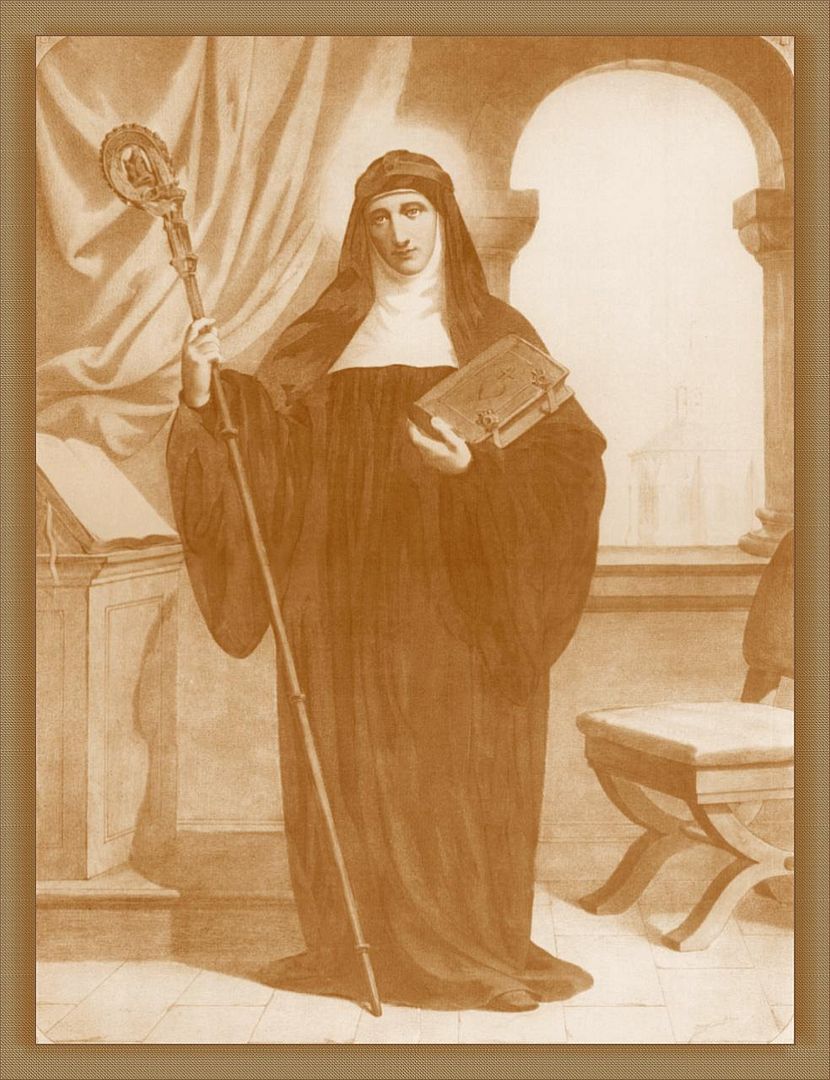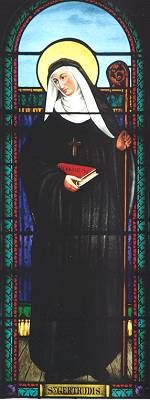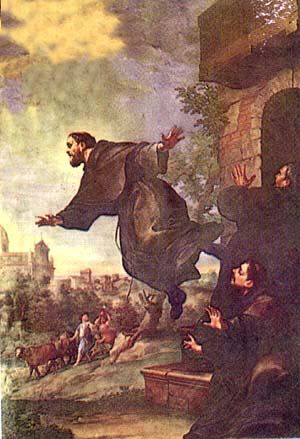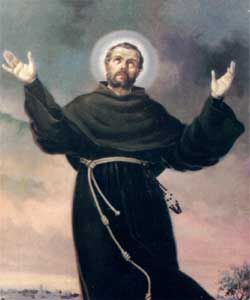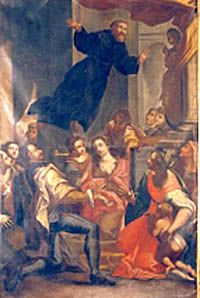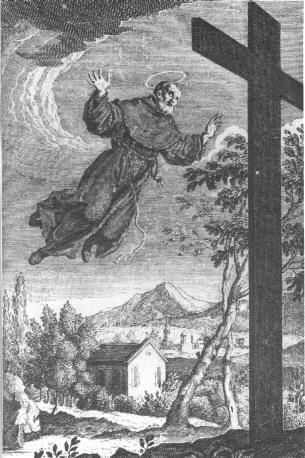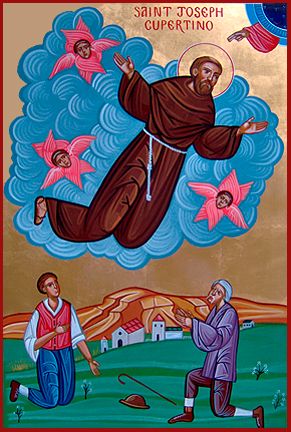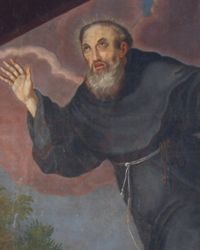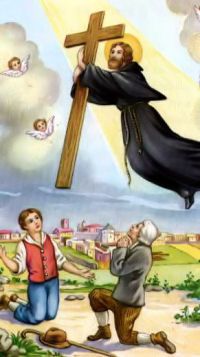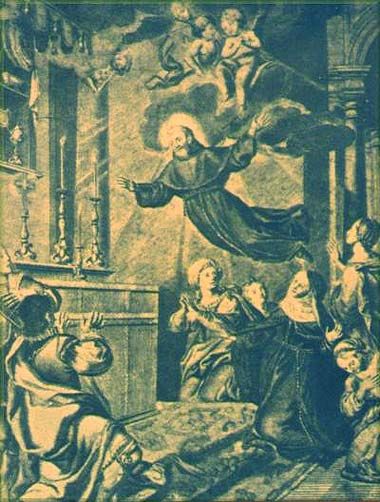Today,
January 16, we celebrate the feast day of Saint Fursey (575-650, also known as
Saint Fursa, Fursy, or Furseus), Bishop of Ireland, visionary, missionary in
East Anglia, and founder and abbot of monasteries. Saint Fursey is remembered not only for his missionary work, but
also for his ecstasies and visions of the afterlife, including clear visions of
Purgatory. Much of his life was
recorded by the Venerable Bede, who wrote of him with the highest esteem.
Saint
Fursey was born on the island of Inisguia en Lough Carri, Ireland. Born into a noble family, his brothers,
Saints Foillan and Ulan, were also called to the faith early in life. Fursey left home at a young age, and went to
the monastery built by Saint Meldan, located on Quinn Island. “He was of very
noble Irish blood!” writes Venerable Bede, "but was much more noble in
mind than by birth… He gave himself very much to reading holy Writ and
following the monastic life even from his boyhood; and he did everything that
he learned ought to be done as is befitting holy men!”
Following his studies at the
monastery on Quinn Island, Saint Meldan sent Fulsey to build a monastery at
Eathmat. This he did, also preaching
and traveling on mission work throughout Ireland. He converted many, drawing more and more into the faith. However, Fursey felt called to leave Ireland
and spread the faith beyond her borders. ''Fursey,” wrote Venerable Bede,
“after having preached the Word of God for many years in Ireland, being unable
to bear the crowds that flocked about him, leaving everything, went away from
his country, and came with a few brethren through the country of the British
into the country of the East-Angles. This holy man, famous for his words and
works and for his wonderful goodness, wishing to live as an exile for our Lord,
came out of Ireland at the time that Saeberht was King, (a.d. 633.) When he had
come to the country of the East-Angles he was welcomed and treated with great
honour by the King. He at once gave himself to the holy work of preaching the
Word of God, and by his great holiness of life and by his sermons, he brought
many unbelievers into the sheepfold of Jesus Christ, and strengthened the
faithful in the Faith and in the love of God.”
Saint
Fursey eventually fell ill, worn out by his tireless preaching and
evangelization. He was not expected to
life long, but rather than succomb, he continued praying and undertook the
construction of a monastery on land given to him by the king. He also began experiencing visions and
ecstasies, the Lord gifting him with knowledge of the afterlife. The Venerable Bede wrote, “Fursey built the
monastery in order to give himself more freely to the study of heavenly things.
He fell sick whilst living there, and being in a swoon, and out of his body,
was found worthy to behold the choirs of the Angels and to hear the hymns that
are sung in heaven. He beheld three days afterwards the happiness of the
Blessed: the Devils who strove to hinder him reaching heaven, and the Angels
who shielded him from their attacks. He heard the Devils accusing him of his
deeds, words, and thoughts, as if they were written in a book: and he also
heard wonderful things, both woeful and gladsome, from the Angels and from the
Blessed!”
“When he
was borne up aloft he was told by the Angels who were by his side to look
downwards towards the earth. He looked,
and beheld beneath him a darksome valley and four fires blazing near each
other. He asked the Angels to tell him what these fires meant, and they said:
‘These fires shall burn the earth to ashes: one is Falsehood and the breaking
of the promise made at Baptism to renounce the Devil and his works; the other
is Covetousness and the preferring worldly wealth to heavenly things: the other
is Discord and offending fellow-men: the fourth is Wickedness and robbery of
the weak.' He then beheld the four fires mingle and become a great blaze. An
Angel made a pathway through it, and an Angel flying with outstretched wings on
each side of him warded off the flames. He saw devils flying through the fire.
He then got a glimpse of heaven. As Fursey, led by Angels, was going through
the pathway in the fire on his way back to earth a Devil laying hold of a
person whom he was torturing in the fire, threw him at him and burned him on
his shoulder and cheek; but the Angel threw him back into the fire. The Devil
said to Fursey: “Do not reject him whom you before received, for as you
accepted the goods of this sinner, so you should have a share in his
punishment!” The Angel answered: “He did not receive it through avarice, but to
save his soul!” and turning to Fursey, the Angel said: “That which you
enkindled burned in you: for had you not received the money of this man who
died in his sins, his punishment would not burn in you.’ Fursey bore the wound of the fire on his
shoulder and cheek for the remainder of his life: the flesh showing outwardly
what the soul had hiddenly endured. He ever strove both by word and example to
persuade everyone to lead a holy life, but he would tell his visions only to
those who wished to hear them and a desire of conversion.”
“An
elderly Monk of our monastery is still alive who is wont to say that a very
truthful and holy man had told him that he had seen Fursey in the province of
the East Angles, and had heard those visions from his mouth, and added that
Fursey when telling them, perspired, as if it were a very hot summer day,
although it was very cold and frosty winter weather, and he was clothed with a
thin garment!”
Saint
Fursey continued his life, surviving his illness, and lived to preach for many
years from his new monastery. He moved
freely amongst the peoples, preaching the Word of God, praying, meditating, and
celebrating Mass. Eventually, the toil of his work led him to seek refuge as a
hermit, and he left the monastery to his faithful brothers and priests, and took
up refuge as an anchorite, living in silence and contemplation for a year.
Despite
his wish to remain in isolation, the world was changing, and the faith was
threatened by invasions of non-believers.
Abandoning all, Saint Fursey sailed to France where he bolstered the
faith of those living there, and built a monastery at Lagny. Saint Fursey followed the invading heathens,
blessing the dead, bringing joy and hope to those who suffered across East
Agnlia, Austrasia, and Europe. Back at
the monastery at Lagny, he worked many miracles of health and healing, and was
so enjoined to build another monastery at Peronne. It was while traveling between that monastery and the monastery
in East Anglia that an angel visited him, telling him that his time on earth
was at an end. Receiving the
Sacraments, he died peacefully, and was buried at the monastery in Peronne. Needing to be moved some time later, to be
enshrined in the church alter, Saint Fursey’s body was found to be incorrupt. “The
merits of St. Fursey," writes Venerable Bede, "have been made known
by many miracles."
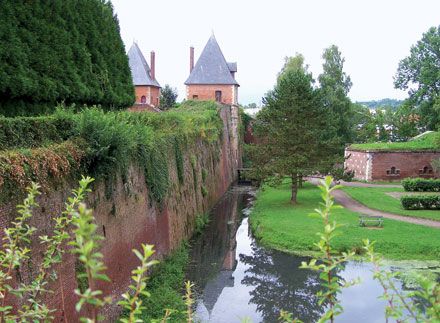 |
| Monastery at Peronne |
Hymn to Saint Fursey
Send back the hymn from Erin's Isle
That echoes from Peronne's blest pile,
While joyful choirs in solemn rite
With Fursey’s praise dispel sad night.
Tis here he builds his far-famed cell,
Tis here his brethren calmly dwell:
The water glances from his rod,
Though planted in the thirsty sod.
And yet that graceless woman rails,
And deems that silver nought avails,
If spent with large and generous hand
To raise high temples through the land
Lamp! Star that gleamest bright,
Saint Fursey shine upon our fight!
Keep up our strength, and take our part,
When death shall strike us with his dart.
May Jesus born of spotless Maid,
Sole fount of hope to all displayed,
With Father and with Holy Ghost,
Make Fursey's sons a heavenly host.
That echoes from Peronne's blest pile,
While joyful choirs in solemn rite
With Fursey’s praise dispel sad night.
Tis here he builds his far-famed cell,
Tis here his brethren calmly dwell:
The water glances from his rod,
Though planted in the thirsty sod.
And yet that graceless woman rails,
And deems that silver nought avails,
If spent with large and generous hand
To raise high temples through the land
Lamp! Star that gleamest bright,
Saint Fursey shine upon our fight!
Keep up our strength, and take our part,
When death shall strike us with his dart.
May Jesus born of spotless Maid,
Sole fount of hope to all displayed,
With Father and with Holy Ghost,
Make Fursey's sons a heavenly host.
Prayer to Saint Fursey
The arms of God be around my shoulders,
The touch of the Holy Spirit upon my head,
The sign of Christ’s cross upon my forehead,
The sound of the Holy Spirit in my ears,
The fragrance of the Holy Spirit in my nostrils,
The vision of heaven’s company in my eyes,
The conversation of heaven’s company on my lips,
The work of God’s church with my hands,
The service of God and my neighbour in my feet,
And a home for God in my heart,
And to God, Father, Son and Holy Spirit my entire being.
Amen.
Throughout 2013, I will be posting the prayer requests
received from the previous week on Sundays. Please join me in lifting
these intentions to Our Lord, through the intercession of Our Blessed Mother.
Prayer requests, 2013: Week 2:
Health and healing for a sick aunt (B, USA-CA); Successful employment (E, Tanzania); Healthy relationship, financial security (S,
India); Resolution to legal situation (M, USA-TX); For the return home of a son
(M, USA-MA); Health and healing for a family (M, USA-OR); For a husband battling mental illness (M,
USA-MN); For an estranged son (J,
USA-OH); For healing and health, for
financial security (F, Cameroon); Healing of a husband, blessings upon a family
(S, India); For successful employment and financial security (J, USA-CA); Hope
and healing, financial security, blessings upon a family (G, USA-CA); For
employment for a daughter, for blessings upon a new career, for financial
security (B, Canada); For healing and
hope for a mother and son (A, Denmark);
Healing and recovery (M, USA-OH); Reconciliation of a family,
forgiveness, (M, India); For guidance in academic careers for children (S,
South Africa); Occupational success, health and healing (F, United
Kingdom); Healing, strength, and hope
(A, USA-LA); For successful return of fiancé in military (E, Australia);.











